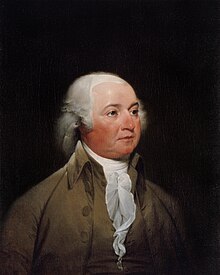John Adams
| John Adams | |
|---|---|
 |
|
|
2nd President of the United States |
|
|
In office March 4, 1797 – March 4, 1801 |
|
| Vice President | Thomas Jefferson |
| Preceded by | George Washington |
| Succeeded by | Thomas Jefferson |
| 1st Vice President of the United States | |
|
In office April 21, 1789 – March 4, 1797 |
|
| President | George Washington |
| Preceded by | Office established |
| Succeeded by | Thomas Jefferson |
| United States Minister to the Court of St. James's |
|
|
In office April 1, 1785 – March 30, 1788 |
|
| Appointed by | Congress of the Confederation |
| Preceded by | Office established |
| Succeeded by | Thomas Pinckney |
| United States Minister to the Netherlands | |
|
In office April 19, 1782 – March 30, 1788 |
|
| Appointed by | Congress of the Confederation |
| Preceded by | Office established |
| Succeeded by | Charles W. F. Dumas (Acting) |
| United States Envoy to France | |
|
In office April 1, 1778 – June 17, 1779 Serving with Benjamin Franklin, Arthur Lee |
|
| Appointed by | Second Continental Congress |
| Preceded by | Silas Deane |
| Succeeded by | Benjamin Franklin (Sole minister) |
| Delegate to the Second Continental Congress from Massachusetts | |
|
In office May 10, 1775 – June 27, 1778 |
|
| Preceded by | Inaugural holder |
| Succeeded by | Samuel Holten |
| Delegate to the First Continental Congress from Massachusetts Bay |
|
|
In office September 5, 1774 – October 26, 1774 |
|
| Preceded by | Inaugural holder |
| Succeeded by | Position abolished |
| Personal details | |
| Born |
October 30, 1735 Braintree, Province of Massachusetts Bay, British America (now Quincy, Massachusetts, U.S.), |
| Died | July 4, 1826 (aged 90) Quincy, Massachusetts, United States |
| Resting place |
United First Parish Church Quincy, Massachusetts |
| Political party | Federalist |
| Spouse(s) | Abigail Smith (m. 1764; d. 1818) |
| Children | Abigail, John Quincy, Susanna, Charles, Thomas, and Elizabeth |
| Alma mater | Harvard College |
| Signature | |
| The Adams Cabinet | ||
|---|---|---|
| Office | Name | Term |
| President | John Adams | 1797–1801 |
| Vice President | Thomas Jefferson | 1797–1801 |
| Secretary of State | Timothy Pickering | 1797–1800 |
| John Marshall | 1800–1801 | |
| Secretary of Treasury | Oliver Wolcott, Jr. | 1797–1801 |
| Samuel Dexter | 1801 | |
| Secretary of War | James McHenry | 1796–1800 |
| Samuel Dexter | 1800–1801 | |
| Attorney General | Charles Lee | 1797–1801 |
| Secretary of the Navy | Benjamin Stoddert | 1798–1801 |
| Supreme Court Appointments by President Adams | ||
|---|---|---|
| Position | Name | Term |
| Chief Justice | John Jay | 1800 (declined) |
| John Marshall | 1801–1835 | |
| Associate Justice | Bushrod Washington | 1799–1829 |
| Alfred Moore | 1800–1804 | |
John Adams (October 30 [O.S. October 19] 1735 – July 4, 1826) was an American patriot who served as the second President of the United States (1797–1801) and the first Vice President (1789–97). He was a lawyer, diplomat, statesman, political theorist, and, as a Founding Father, a leader of the movement for American independence from Great Britain. He was also a dedicated diarist and correspondent, particularly with his wife and closest advisor Abigail.
He collaborated with his cousin, revolutionary leader Samuel Adams, but he established his own prominence prior to the American Revolution. After the Boston Massacre, he provided a successful (though unpopular) legal defense of the accused British soldiers, in the face of severe local anti-British sentiment and driven by his devotion to the right to counsel and the "protect[ion] of innocence". Adams was a delegate from Massachusetts to the Continental Congress, where he played a leading role in persuading Congress to declare independence. He assisted Thomas Jefferson in drafting the Declaration of Independence in 1776, and was its foremost advocate in the Congress. As a diplomat in Europe, he helped negotiate the eventual peace treaty with Great Britain, and acquired vital governmental loans from Amsterdam bankers. Adams was the primary author of the Massachusetts Constitution in 1780 which influenced American political theory, as did his earlier Thoughts on Government (1776).
...
Wikipedia
